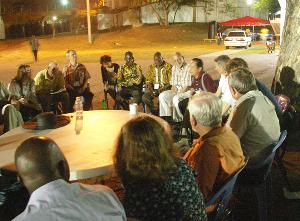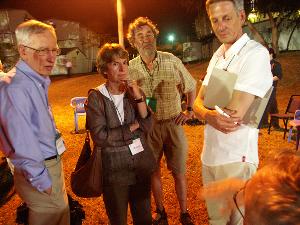
A group from the peace churches held an informal gathering at an outdoor cafe on the University of the West Indies campus. Almost 30 Quakers, Brethren, and Mennonites gathered from several different countries. Three or more languages were spoken around the circle. Enns led the gathering.
One of the results of the Decade to Overcome Violence (DOV) has been the full inclusion of peace churches in the ecumenical family of the World Council of Churches, asserts Fernando Enns. Interviewed in the Peace Convocation meeting tent after opening worship this morning, Enns reviewed the role of the Historic Peace Churches (Church of the Brethren, Mennonites, and Quakers) in the Decade, and commented on what he sees as a major shift in attitude toward the Gospel of Peace by many other churches.
Enns holds a lot of responsibility here at the peace convocation: he is a delegate from the Mennonite Church in Germany, a member of the World Council of Churches Central Committee, moderator of the convocation planning committee, and consultant to the “message committee” that will weave the convocation experience into a final message from the IEPC. At home in Germany, he teaches theology and ethics at the University of Hamburg, with a special focus on peace theology.
“Of course the Historic Peace Churches have been involved,” he said, adding that this decade has made it obvious how needed they are in the WCC–especially in the areas of theology and spirituality. In particular, over the course of the Decade, Enns has seen the peace churches being a connecting point, aiding other churches to come together on a theological level and facilitating discernment.
Peace churches also have been putting concepts of peacemaking to work in local settings. He pointed to the example of the Mennonites in Germany, who have started a peace center in Berlin. They are trying to find out what it means to be a peace church there, “in the capital city, in a formerly divided city.”
On national levels, for example in the United States and in Indonesia, he has seen peace churches able to be part of larger ecumenical involvements in peace work, “to call the other churches to become messengers of reconciliation.”
On the international level, the continental gatherings of the Historic Peace Churches–five in all, held in Europe, Africa, Asia, North America, and Latin America and the Caribbean–have answered a call from the WCC to bring a strong contribution to the discussions of the Decade.

Fernando Enns (right) speaks with Brethren and Quaker representatives to the peace convocation. Shown above, Robert C. Johansen and Ruthann Knechel Johansen (from left) discuss how the final message from the IEPC will be formulated. Enns serves as moderator of the planning committee for the IEPC and is a consultant to the message committee, as well as serving on the WCC Central Committee.
Within the WCC itself, leadership has tried to make sure the voices of the peace churches are heard, Enns said. He saw this especially in WCC discussion of a 2006 statement on the “responsibility to protect.”
But as the Decade to Overcome Violence comes to a close, “the voice of our churches is still very much needed,” Enns emphasized. It is useful, he said, to have a voice at the WCC table that does not accept military intervention as an option.
This is where he has witnessed what he calls a “major shift” in thinking in ecumenical circles. Those who still consider the military as an option now have to justify themselves. The ecumenical conversation has shifted much more to active peacemaking by nonviolent means. “I think churches have realized you cannot solve conflicts by military means,” he said. Ten years ago, this was not so obvious to many churches, Enns commented.
The conversation about what peace means has become much broader, including conflict prevention, nonviolent conflict resolution, processes of healing and reconciliation, and more.
This shift has not come about simply through the Decade to Overcome Violence. The 2001 terror attacks and the violent response, the wars in Iraq and Afghanistan, conflict in the DR Congo, and other world events also have contributed, in Enns’ point of view. There is a growing awareness of the complexity of issues surrounding violence, he said. Some churches, especially in Europe, the US, and Canada, “have realized that to stay with the powerful all the time is corrupting your being a church.” These churches are “realizing they are selling out their identity if they don’t have a critical voice.”
Speaking of voice, Enns quickly point out that the peace churches “can’t take it for granted that we have the same voice. We don’t understand ourselves as one unified organ.” This was another outcome of the series of continental meetings over the course of the Decade: discernment about whether Brethren, Mennonites, and Quakers actually can speak with a common voice, and if the three groups are indeed “on the same page here,” he said.
This discernment was the main purpose of the first continental meeting in Europe, held in Bienenberg, Switzerland. It became clear at that meeting that the peace churches need to listen much more to “the voices of the South,” Enns reported–in part to gain insight from the struggles of peace churches who suffer most directly from economic violence, violence in cities, violent consequences of climate change.
As the Decade closes, there is a lot more work to be done. One thing that needs to be developed, in his point of view, is a theology of just peace, Enns said. And work on how the concept of just peace “unfolds through the different dimensions of society.” For example, economics is a “pressing and ever growing root cause of violence,” he said. He called the whole economic system that holds sway in the majority of the world “a culture of violence.”
Civil wars are becoming another major challenge to the peace witness, he added, as is the culture of violence in the large cities of the world. “More people die in big cities on the streets…than all the wars we see,” he said. The problem of big city violence is also complex, and includes aspects like the weapons trade. For example, as a German Mennonite he has to grapple with the fact that his own country is now the third largest arms supplier in the world. This means his church needs to discern its responsibility to ask critical questions about Germany’s role in helping to put weapons on the streets.
As this Peace Convocation continues through next week, Enns will be one of those working tirelessly in the background to help the churches represented here discern their own responsibility to ask critical questions of the use of violence around the world.